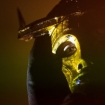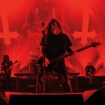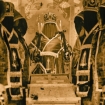When Batushka tried to play Russia, things did not go very well. "There were pickets of church activists in front of the clubs," recalls the Polish black-metal band's Bartłomiej Krysiuk. "We had to cancel due to security reasons. I think that our art is moving. It raises controversy and sparks discussion. We are not going to leave this path. If it results in problems, so be it. We will endure them and move to another place where they will welcome us with open arms."
The truth is, though, open arms are now harder to find than ever. Many metal bands are "blasphemous," as Krysiuk admits his group is, but Batushka are a special brand of blasphemy. Their music and lyrics — the latter written exclusively in the Old Church Slavonic language — are inspired by the Eastern Orthodox Church, and the band wears habits and eastern orthodox schemas during live shows. Batushka made a splash in the underground with their 2015 debut album, 'Литоургиіа,' a.ka. Litourgiya (in English, "Liturgy"), their whole production reading as a particularly evil inversion of divine language, music and ritual. Which would be polarizing enough if Batushka hadn't then taken steps that split their growing fan base into heckling factions.
In the beginning, it was much simpler. In 2015, a Polish musician named Krzysztof Drabikowski came across the comment, "God's hymns are more metal than any satanic black metal music out there" while perusing YouTube comments left below liturgical songs of the Orthodox Christian church. This, thought Drabikowski, sounded like a challenge: how to use the tools of the divine to create the most evil-sounding black-metal brew possible. He roped in Marcin Bielemiuk to play the drum parts, then Krysiuk — who Drabikowski knew from the band Hermh — to lay down vocals.
"Extreme-metal music utilizes atmosphere to emphasize the message," explains Krysiuk today, "and so the idea was to show that Orthodox songs often have a 'satanic vibe' to them. In fact, they can be perceived as far more sinister and evil than the ones you'll find in true black metal. Forget the blood, forget the overuse of the word 'Satan.' What I'm talking about is the sublimity and the aura that rises with the incense smoke. And for me, that is the essence of Batushka's extremism."
The band's name comes from the way to address an Orthodox priest, and under that moniker, Drabikowski, Bielemiuk and Krysiuk spent much of 2015 holed up in their base on the Biała river, in southern Poland, writing Litourgiya. Drabikowski painted the album artwork. He wrote the lyrics. The record was released later that year on Krysiuk's label, Witching Hour Productions. Each song on it adhered to a framework of self-imposed rules. Most notably, they would all be sung in Old Church Slavonic, a language that Krysiuk didn't know, as well as one that had been long dead.
"I studied the Russian language for eight years at school," says the singer. "During the Nineties it was compulsory. Because the Old Church Slavonic language is similar to Russian, it wasn't too hard to learn."
Krysiuk was game to put in the effort. He grew up poor in a small, rural village in Poland without modern amenities, such as running water, and was used to putting his nose to the grindstone. "Life was simple, beautiful and all about hard work," he says. "My life in the countryside shaped and hardened me."
What also shaped him, and by proxy, Batushka, were the six years he spent studying in what he describes as "one of the oldest monasteries in Poland." "I met the Orthodox monks who lived in the monastery in Supraśl," he recalls. "Crypts in which monks were buried were freely available to us. We often consumed alcohol there when dealing with bones of monks buried in catacombs. We would run away from classes to listen to specific singing during the monks' daily prayers under their windows. The whole creation you see onstage with Batushka is genuine. It's not an artistic vision detached from reality."

That artistic vision ordained that the band wear habits and schemas to hide their identities. They took on pseudonyms. Drabikowski would be Христофор; Krysiuk, Варфоломей; Marcin, Мартин. They toured under these guises with countrymen Behemoth. "I've never sought to satisfy my vanities and to put my name everywhere," explains Krysiuk. "I've never needed to convince myself that what I do is valuable. I believe that the anonymity of the creator gives more scope for the recipient to explore the creation. I wanted to avoid directing the listener to an interpretation. But the situation forced me out of the shadows ..."
"The situation" is a complicated one, and in all likelihood, no one but the three men who were there at the beginning will ever know the truth about what happened next, yet the end result is clear: After an internal power struggle within the band, both Drabikowski and Krysiuk currently operate projects called Batushka, and each released 2019 albums, 'Панихида' and Hospodi, respectively. Legal proceedings continue as to who can lay claim to the exclusive rights to the band's name, but for now, Krysiuk's Metal Blade–signed incarnation remains the higher-profile and more active entity, having toured the U.S. and played major festivals such as Download since the fracture. This being 2019, views about who should own the name spilled out of the courthouse and onto the internet long ago. They've spilled out at live shows, too: When Krysiuk's iteration played their native Poland last year, a vocal segment of the audience chanted "Krzysztof!" throughout. It is, frankly, a mess.
Yet Krysiuk remains convinced he has claim to the name. That he was a core contributor to the original project and its success. Most of all, though, he's done with discussing the matter. "One could talk for a long time about this sick situation, but let's leave it at that," he says.
Whether you believe Krysiuk is the rightful heir to Batushka or not, his current band is unquestionably authentic in its own right, drawing on his personal vision, experience and unremitting questioning of faith. "I believe that religion is about searching for the truth," he says. "The longer I live, the more I'm convinced that this is a path that is full of question marks. The more I try to answer those question marks the more I know that they will be unanswered. I treat religion as something very personal. Religion is the search for inner peace. It's a metaphysical willingness to know oneself. I'm still looking, finding something new. This journey never ends."








